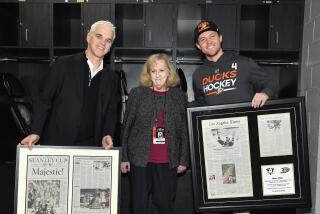Pauline Frederick Dies at 84; Helped to Open Broadcast Journalism to Women
- Share via
Pauline Frederick, a pioneering broadcast journalist who helped open radio and television newsrooms to other women, has died.
Miss Frederick, who was 84, died Wednesday after a heart attack in the Chicago suburb of Lake Forest, where she had been visiting relatives.
“She was the first full-fledged woman correspondent and opened doors for women’s acceptance in television and radio journalism,” said Beryl Pfizer, a news producer at NBC who had worked with Frederick. “And besides, she was a heck of a person.”
Born in Gallitzin, Pa., Miss Frederick earned bachelor’s and master’s degrees in international law from American University in Washington, D.C., and began her career interviewing the wives of diplomats and other news makers for the now defunct newspaper, the Washington Star.
She broke into broadcast journalism in the 1930s, when ABC hired her to cover a forum on how to get a husband.
Miss Frederick did her first international reporting from China in 1945, and in 1948 took her first crack at television when ABC assigned her to cover the Democratic National Convention.
“I got in that door,” she once said, “because in those days the men didn’t know any more about television than the women!
“I went to Elizabeth Arden to learn about makeup and to Bonwit Teller to learn about how to dress, and always I got plenty of advice on how I should look,” she said. “Management wanted me in navy colors with austere necklines; they insisted I lighten my dark brown hair; they told me to wear contact lenses instead of glasses, and they continually had my hair teased because they said I was too flat-headed.”
Miss Frederick also covered the Korean War for ABC, but in 1953 moved to NBC, where she spent 21 years as its United Nations correspondent.
In 1976, Miss Frederick became the first woman to moderate a presidential debate--between Gerald R. Ford and Jimmy Carter in San Francisco.
She also was the first woman to be elected president of the United Nations Correspondents Assn., the first woman to receive a George Foster Peabody Award for broadcasting achievements, and the first woman to receive the highest award of the Radio-Television News Directors Assn.
After her mandatory retirement from NBC in 1974, when she was 65, Miss Frederick became an international affairs analyst for National Public Radio.
“If a man is old, he’s called interesting,” she said. “When a woman is old and shows wrinkles, it’s terrible. She’s finished. It’s a double standard.”
Miss Frederick was the widow of Charles Robbins, former reporter and managing editor of the Wall Street Journal.
More to Read
The biggest entertainment stories
Get our big stories about Hollywood, film, television, music, arts, culture and more right in your inbox as soon as they publish.
You may occasionally receive promotional content from the Los Angeles Times.










